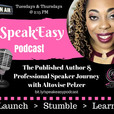Breaking Through Emotional Impact with Howard Ross

Summary: Advocacy takes on different roles in order to empower the voice and impact the lives of people. In today's episode, I had the opportunity to speak with Howard Ross about the past, present, and future of advocacy. Education will always be what inspires change and action will be the driving force. We see it throughout history. <br><br>"My whole life I've come to realize that if you're going to spend your life shaking the trees, occasionally a coconut is going to hit you on the head."<br><br>Fighting for the rights of others means fighting for a better society. Howard went to his first Civil Rights at the age of 15 and with over 55 years of advocating for others, you can see that it made a huge impact in his life. He shared with us significant impacts that his family has made when it came to advocacy. Being Jewish during the Holocaust, 43 members of Howard's family were murdered. His own grandfather was living in a village where 100 Jews were killed by Nazis. <br><br>The emotional impact of what we see, hear, and live through can be the spark to initiate change. It can become a heavy shadow on the families, communities, and generations that are connected to it in some way. We see a huge shift as younger generations are taking the reigns and demanding results in a similar way that we saw Baby Boomers do when they were younger. On one hand, it can make you proud that they have the motivation to do so but on the other, it can be saddening that we are still fighting the same fight.<br><br>Howard dropped nuggets about we can do better when it comes to understanding and or being part of the current wave of advocates. I stumbled into advocacy because of my personal experiences with homelessness, abuse, molestation, and divorce. Prejudice against a certain group of people usually comes from a disconnect between their story and your own. <br><br>Howard's nuggets: <br>~ Remember those that came before you and the life the lived <br>~ Use the emotional impact as fuel but be strategic <br>~ Understand that change does not always happen immediately<br>~ Do the research on what you hear<br>~ Protests matter and have their place in initiating change <br>~ Anger and rage are valid emotions when you feel unheard or mistreated<br>~ NEVER label the majority by the actions of the few <br><br>This episode will be my most memorable because the current climate of the world is a tough one to navigate. I appreciate the advocates that stand up in the face of fear, miseducation, prejudice, and miscommunication to fight for something bigger than them. I think back to when I first watched movies like Freedom Writers and Lean on Me. It was significant for me because it was a seed of understanding that we each can do something that matters. We each have the power to make an impact. <br><br>To the advocates who consistently fight for change...we see you! Thank you! <br><br>Meet Howard Ross:<br><br><br>Howard Ross is a lifelong social justice advocate and is considered one of the world’s seminal thought leaders on identifying and addressing unconscious bias. He is the author of ReInventing Diversity: Transforming Organizational Community to Strengthen People, Purpose and Performance, (published by Rowman and Littlefield in conjunction with SHRM in 2011), and the Washington Post bestseller, Everyday Bias: Identifying and Navigating Unconscious Judgments in Our Daily Lives, (published by Rowman and Littlefield in 2014). His latest book, Our Search for Belonging: How Our Need to Connect is Tearing Us Apart, released by Berrett-Koehler in May of 2018, won the 2019 Nautilus Book Award Gold Medal for Social Change and Social Justice.<br>Howard has specialized in the synthesis of neuro-cognitive and social science research and direct application re Diversity, Inclusion, Equity, and Accessibility work. His client work has focused on the areas of corporate culture change, leadership development, and managing...